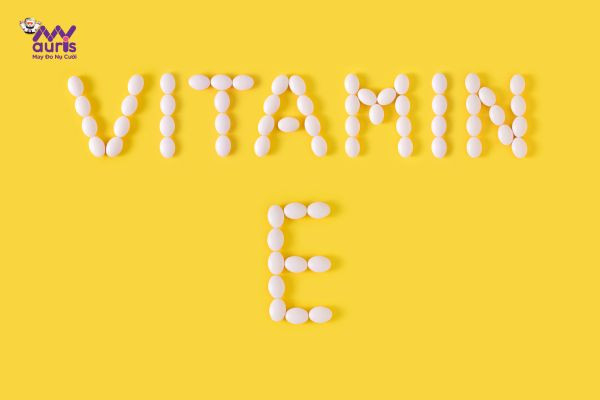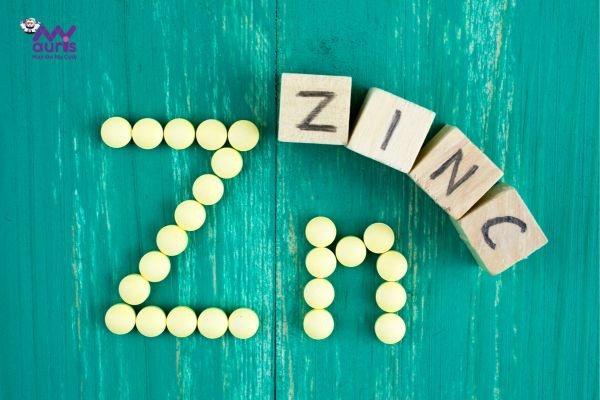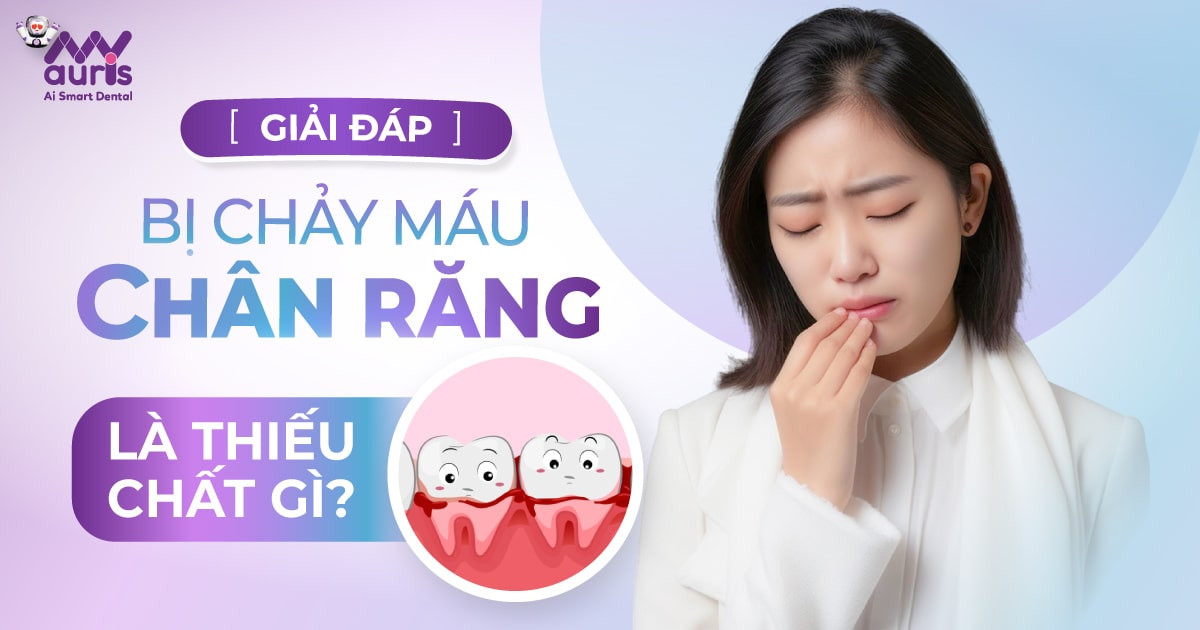Bleeding gums is a not uncommon condition caused by many causes. In particular, a diet lacking micronutrients also causes tooth roots to bleed. So what substance is lacking in bleeding gums? Let’s find out in detail with My Auris through the following article.
What substance is lacking in bleeding gums?
Bleeding gums is the phenomenon of bleeding gums when eating, chewing, brushing teeth or when there is no impact. still have it. Usually, this case is caused by a lack of nutrients. What is the deficiency in bleeding gums?
Vitamin C deficiency
Vitamin C is known as an essential water-soluble vitamin, indispensable for the body, especially oral health. When the body lacks vitamin C, it will hinder the production of collagen in capillaries, bone tissue and connective tissue. From there, it affects the health of the gums, the gum tissue becomes thinner and less firm. This can cause bleeding gums when chewing or even just a small impact.

Vitamin D deficiency – What is the deficiency in bleeding gums?
Vitamin D promotes the body’s absorption of calcium and phosphorus. This is an extremely important factor to help keep bones and teeth strong. Vitamin D deficiency will also affect teeth, making them weak and prone to bleeding.
Vitamin K deficiency
In the body, vitamin K plays an important role in keeping blood clotting and slowing the bleeding process. Therefore, a deficiency of this vitamin will cause the blood to become thinner and bleed more easily, including bleeding gums.
Vitamin B3 deficiency – What is the deficiency in bleeding gums?
Vitamin B3, also known as niacin, is an essential B vitamin for the body. For adults, vitamin B3 helps reduce cholesterol in the blood and promote better blood circulation. For children, vitamin B3 provides energy for the nervous system, mucous membranes and skin structure. If the body lacks vitamin B3, blood sugar levels and red blood cell balance are also affected, causing bleeding gums.
Vitamin E deficiency
Vitamin E is a vitamin that plays an important role in vision, reproduction, teeth and skin. Vitamin E is also an antioxidant that enhances immunity and protects mucous membranes. Therefore, a lack of vitamin E will also cause bleeding gums.

Calcium deficiency – What is the deficiency in bleeding gums?
Calcium is an important mineral that helps maintain strong bones and teeth. Furthermore, calcium also supports blood clotting and prevents bleeding when damaged blood vessels. Thus, lack of calcium in the body not only makes teeth weak but also increases the risk of bleeding gums.
Lack of phosphorus
Phosphorus is the second most abundant mineral after calcium in teeth and bones. For adults, about ¾ of phosphorus is concentrated in bones and teeth. For children, phosphorus is also important in bone development and height.
When the body lacks phosphorus, the teeth are not only weak but also cause weak gums to be attacked by bacteria, causing bleeding gums and infection.
Zinc deficiency – What is the deficiency in bleeding gums?
Zinc is an essential mineral in enhancing immunity, growth, cell division and participating in the formation of organizations such as blood, bone system development, smooth muscle, etc. When the body lacks zinc, immune function declines, bacterian easily attack the mouth and body. Once the gum area is weakened, it will be easily damaged and cause bleeding gums.

It can be seen that nutrients play an important role in body and oral health. Especially micronutrients, even though they only need very small amounts every day. Prolonged deficiency will weaken teeth and gums, leading to bleeding gums.
How to take care of your teeth when bleeding gums
Brush your teeth properly
Brushing your teeth too hard or improperly will not clean your teeth but will also increase the risk of bleeding gums. Therefore, you should choose a suitable brush, small size, soft bristles. Experts recommend changing your toothbrush every 2-3 months.
When brushing your teeth for realGently and with proper technique from top to bottom, inside to outside, from left to right to remove plaque and food debris. Brush your teeth regularly 2-3 times a day.

Living habits
In daily life, you can do some of the following ways to help overcome the problem bleeding gums, firm gums, healthy teeth:
- Ice: Use an ice bag or thin towel wrapped with ice cubes to apply to the bleeding gum area. Low temperature helps stop bleeding quickly and reduces pain in the gums. Only apply the compress for 10-15 minutes at a time, avoid leaving the compress in one place for too long.
- Use warm salt water: Salt water has the effect of reducing inflammation, antibacterial, and soothing swollen and bleeding gums. At the same time, salt water also effectively prevents gingivitis and bleeding gums.
- Use mouthwash: Currently, there are many mouthwash products that both remove plaque, clean teeth and firm gums. Please consult your doctor to choose the right product.
- Avoid smoking: According to research, smoking is one of the factors that weakens gums and increases gum disease. To reduce and overcome gum bleeding, you should quit smoking.
Nutrition
As you know, nutrition plays an important role in oral health. Nutrient deficiencies will increase the risk of bleeding gums. Therefore, in the daily diet, it is necessary to supplement a variety of foods but need to focus on some food groups such as:
- Foods rich in calcium: milk, eggs, fish, cheese, yogurt, dark green vegetables,…
- Foods rich in phosphorus: chicken, pork, seafood, milk, whole grains, pumpkin seeds, sunflower seeds,..
- Foods rich in zinc: oysters, shrimp, crab, peas, chia seeds, soybeans, flaxseed, red meat, mushrooms, milk, oats, avocado,…
- Foods rich in vitamin C: citrus fruits, berries, tomatoes, bell peppers, guava, carrots,…
- Foods rich in vitamin K: spinach, cabbage, mustard, basil, bamboo shootsroses, avocados, plums, carrots, green beans,…
- Foods rich in vitamin D: fish, fish liver, milk, mushrooms, cereals,…
- Foods rich in vitamin B3: chicken breast, turkey, salmon, avocado, brown rice, wheat, green beans, potatoes,…
- Foods rich in vitamin E: nuts and seed oils such as almonds, hazelnuts, palm oil, grapeseed oil, pistachios, cashews,… salmon, shrimp, kiwi, sapodilla, berries, asparagus,…

In addition to the foods you should eat, when you have bleeding gums, you need to limit the following foods:
- Foods high in sugar and starch such as fast food, cakes, candy,…
- Drinks containing stimulants such as coffee, tea, energy drinks,…
- Foods that are too hard, too chewy
- Foods that are too hot, too cold
Above is information about what is the deficiency of bleeding gums, hope everyone knows how to take better care of their teeth. At the same time, schedule regular dental visits to check and monitor your best oral health. Please contact My Auris Dental immediately to schedule an appointment as soon as possible.
Anh Thy





